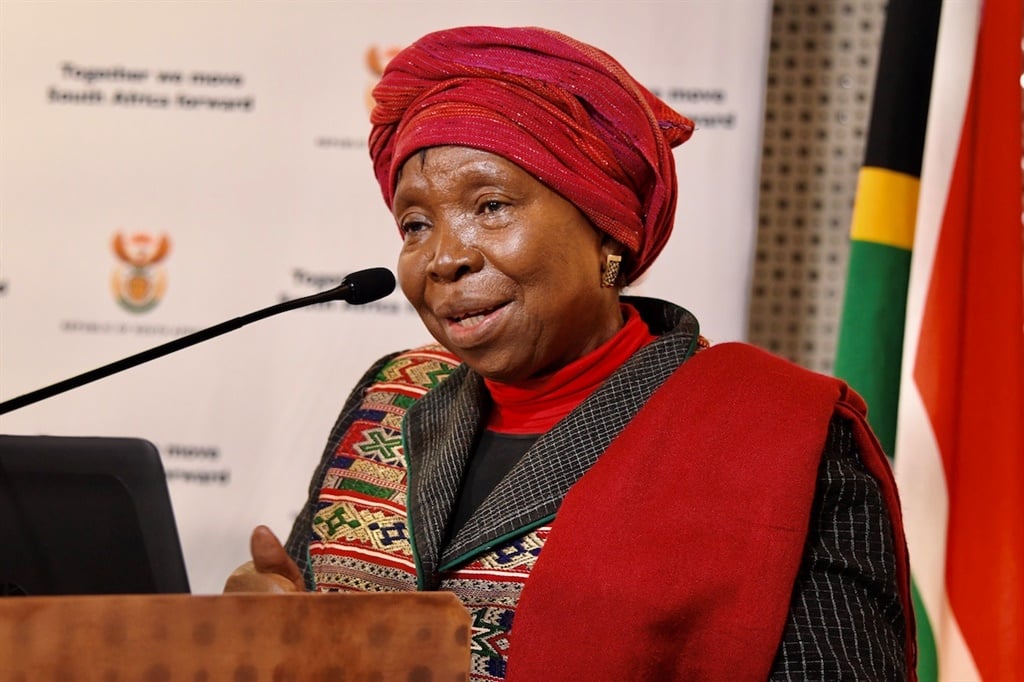


Cooperative Governance and Traditional Affairs Minister Nkosazana Dlamini-Zuma.
- Municipalities across the country are failing to reduce irregular expenditure.
- In some municipalities, there is a lack of responsiveness to implement and monitor action plans.
- Interventions by provincial governments have at times worsened the problems in municipalities.
South Africa’s municipalities are drowning in their financial sorrows and the casualties are piling up.
Poor financial audit outcomes and political instability were just some of the issues that led to interventions at 46 municipalities across the country.
In some municipalities, which had Section 139 of the Constitution invoked on them, funds have dried up and delivering services have become near impossible.
Officials of the Department of Cooperative Governance and Traditional Affairs briefed Parliament’s Cooperative Governance and Traditional Affairs Committee during a hybrid sitting on Tuesday.
Deputy director-general Themba Fosi said even though interventions were meant to improve municipalities’ operations, there were still challenges with provinces.
“Provinces tend to deploy one person as an administrator without concomitant experts as per the diagnosis of the challenges encountered in the municipality, such as financial or human resource experts where required.
“Inadequate oversight by some provincial legislatures leading to non-submission of progress reports. This sometimes leads the intervention not yielding positive results,” he said.
He quoted the Auditor-General’s (AG) perspective of each province with regards to oversight, governance and “monitoring of municipalities in general”.
Eastern Cape
Vacancies and instability in key positions resulted in a lack of preventative controls being implemented over financial and performance reporting as well as non-compliance with legislation.
There was a general tolerance for transgressions, and this led to an ongoing culture of poor performance and inadequate consequence management processes.
Free-State
The non-improvement of outcomes were characterised by a lack of discipline to implement the basic accounting principles of promptly processing and reconciling transactions, proper record keeping and regular reviews of work done by management. Another reason for the lack of improvement in these audit outcomes was the unwillingness to comply with legislation, specifically relating to supply chain management.
READ| Eskom attaches Maluti-a-Phofung bank account over R5.3 billion debt
Gauteng
Despite efforts to reduce irregular expenditure, the AG’s concerns are that the total irregular expenditure remains high. The City of Tshwane metro has a history of high levels of irregular expenditure incurred due to the non-monitoring of preventative controls, which resulted in supply chain management non-compliance.
Examples of this include R2.72 billion and R643 million for the smart prepaid meter and infrastructure project management services contracts, respectively. During the 2018/19 financial year, the AG identified irregular expenditure of R2.9 billion, of which the majority (R2.4 billion) related to expenditure on contracts awarded in prior years.
DA MP Cillier Brink disputed the smart prepaid meter contract.
KwaZulu-Natal
District municipalities continued to struggle with basic financial and performance management processes. There is also a lack of responsiveness to implement and monitor action plans and weaknesses in governance structures prevented effective accountability. The AG is concerned the Edumbe and Mtubatuba (district municipalities) regressed to qualified opinions from unqualified opinions. Improvements were noted in Richmond and Msunduzi from adverse opinions to qualified and Abaqulusi improved from qualified opinions to unqualified.
Limpopo
Municipalities received a qualified audit opinion as they were still struggling with the implementation of basics for financial reporting, with findings on compliance and performance management. One example, the Fetakgomo-tubatse Local Municipality invested funds with the now defunct VBS Mutual Bank and incurred losses on the balance of the investment amounting to R243 million. This put strain on the municipality’s ability to deliver services to communities.
ALSO READ| Municipalities are in a crisis with the wrong people at the till
Mpumalanga
The AG observed the intergovernmental support did not have the desired impact. Local government’s financial resources continued to decline at a time when municipalities are under increasing pressure to provide services.
North West
The intervention by the provincial treasury and Department of Cooperative Governance was riddled with political infighting and caused further instability within the municipalities, delaying improved delivery of services to communities.
Northern Cape
Officials who did not perform their duties were still not being held accountable by municipal managers and senior management, perpetuating the culture of no consequences, the AG found. The commitments by the premier, speaker and cooperative governance, human settlements and traditional affairs MEC as well as councils were again not implemented; and while consequences were often referred to in various meetings, little action was evident.
Western Cape
The AG highlighted in Kannaland Local Municipality there is a lack of oversight due to instability in the political and administrative positions. Key positions such as those of the chief financial officer and supply chain management manager have not been filled permanently, with different employees acting in these positions.

